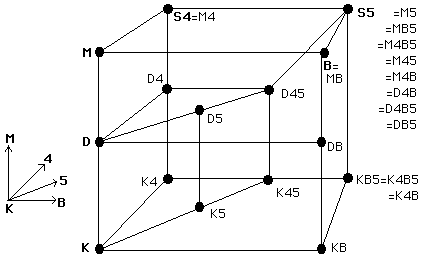I'd just like to recap here the debate that took place in class on teus between Chris & me. The spark was the following argument against linguistic ersatzism:
Consider and alien individual a, and another alien individual b. Consider two worlds that are qualitatively identical, but in w2 a is qualitatively identical to b in w1, and vice versa. The argument can proceed as follows:
1d) Our language (L) cannot distinguish between w1 and w2
2d) w1 and w2 represent to distinct possibilities
3d) (1)&(2)
4d) if (3) then (5)
5d) Linguistic ersatzism conflates some possibilities that should be distinct
After some deliberation, it was noted that a & b must be unnamable, else (1) does not hold.
I (with waving hands) wanted to deny (2). Chris gave a motivation for why (2) should be accepted:
(1) The property of being nameable is ontologically insignificant
(2) Were a and b nameable, then (2d) would hold
(3) (1)&(2)
(4) if (3) then (5)
(5) (2d)
I countered with this:
(6) If a is nameable then a is describable in terms of actual things
(7) being describably in terms of actual things is ontologically significant
(8) (6)&(7)
(9) if (8) then ~(1)
(10) ~(1)
Leaving aside the obvious issue of spelling out what it is to be describably in terms of actual things, or what ontological difference that's supposed to make, let's move on. Let's call things describable in terms of actuals "impure hypotheticals" and things not describable in terms of actuals "pure hypotheticals". So the handsom man resulting from the sperm that Adam came from and the egg that Chelsea came from (call him Chadam) would be an impure hypothetical. Gandalf the White from Tolken's fantasy would be a pure hypothetical. So my position could be called anti-hecceatism about pure hypotheticals.
Chris then posed a different argument:
Consider a purely descriptive world W that is complete in the appropriate ways and conforms to tolken's Lord of the Rings universe. Chris's argument could run like so:
(11) anti-hecceatism about pure hypotheticals
(12) if (1) then (3)
(13) W would be one possibility
(14) if (13) then (15)
(15) W is necessarily exactly one possibility
(16) Necessarily if W were actual W would be many possibilities
(17) if (15) then (18)
(18) necessarily W is not many possibilities
(19) Necessarily W is not actual (16, 18, necessary MT)
(19) is very bad if we want W to be a real possibility. I responded by denying (12). W is not one possibility because any actual individuals could play the individual roles in W, making for distinct possibilities. For instance, Chris could be qualitatively identical to Gandalf in W, or Chelsea could be.
I think I captured most of the main arguments for this issue. A couple motivations for anti-hecceatism about pure hypotheticals:
A) It seems like there's a difference between Chadam and Gandalf (just an intuition)
B) All accidental properties belonging to a pure hypothetical are stipulative. This is not true for impure hypotheticals (for instance, I need not stipulate that Chadam is male). This may support the intuition that there is little more to pure hypotheticals than their stipulated properties.
Wednesday, July 25, 2007
Subscribe to:
Post Comments (Atom)

1 comment:
Disclaimer:
I don't endorse linguistic ersatzism. It seems implausible to me that something being possible merely means it's consistently expressable in some language
Post a Comment